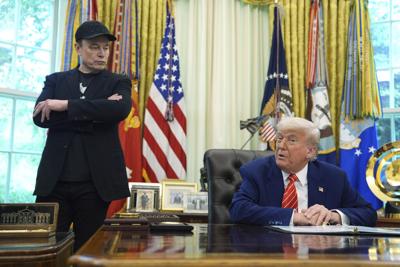The Washington Post published this editorial on July 8. It was distributed by the ňňň˝ĘÓƵsociated Press.
Elon Musk last week slammed President Donald Trumpňňň˝ĘÓƵ™s ňňň˝ĘÓƵśbig, beautiful billňňň˝ĘÓƵť for the trillions in new federal debt it is projected to cost ňňň˝ĘÓƵ” a subject well worth the nationňňň˝ĘÓƵ™s attention. House Speaker Mike Johnson, R-La., however, pointed to a different possible motive for the tech billionaireňňň˝ĘÓƵ™s dissatisfaction with the bill: It ňňň˝ĘÓƵśhas an effect on his business,ňňň˝ĘÓƵť the speaker said.
Johnson suggested that Musk began his campaign against the bill after they spoke about an obscure policy the act would roll back ňňň˝ĘÓƵ” one that has directed billions of dollars to Tesla, Muskňňň˝ĘÓƵ™s electric vehicle company.
Johnsonňňň˝ĘÓƵ™s claims provide a revealing look at the side effects of well-meaning ňňň˝ĘÓƵ” but not all that well designed ňňň˝ĘÓƵ” government mandates (in this case, for the automobile industry to reduce emissions in specific ways), and how they can distort both politics and the economy. While the bill has many flaws, Republicans are right to object to the Tesla gravy train. Rather than keep it, as Musk would probably prefer, they should replace it with clean energy policies that promote competition and choice.
Tesla heavily depends on selling automotive regulatory credits to traditional automakers. Manufacturers of gas-powered cars are failing to produce as many zero-emissions vehicles as national and state-level mandates from Washington, Sacramento and Brussels require. Consumersňňň˝ĘÓƵ™ appetite for EVs has grown, but not enough for traditional carmakers to transition off gas as quickly as the mandate-writers would have liked. So those companies must buy credits from EV-makers such as Tesla, which produces only zero-emissions vehicles.
In 2024, Tesla made $2.76 billion on emissions deals, a 54% increase from the year before. During the first quarter of 2025, Tesla reported earning $595 million in regulatory credits, even as its total net income for the period was only $409 million.
A February Post analysis found that Musk and his businesses received at least $38 billion in government contracts, loans, subsidies and tax credits over the years, including $11.4 billion through automotive regulatory credits. ňňň˝ĘÓƵśAbout a third of Teslaňňň˝ĘÓƵ™s $35 billion in profits since 2014 has come from selling federal and state regulatory credits to other automakers,ňňň˝ĘÓƵť The Post tabulated. ňňň˝ĘÓƵśThese credits played a crucial role in the companyňňň˝ĘÓƵ™s first profitable quarter in 2013 and its first full year of profitability in 2020. ňňň˝ĘÓƵ¦ Without the credits, Tesla would have lost more than $700 million in 2020, marking a seventh-consecutive year with no profits.ňňň˝ĘÓƵť
If you havenňňň˝ĘÓƵ™t heard of these regulatory credits, youňňň˝ĘÓƵ™re not alone. Even for those paying close attention, the EV policy fight that has attracted the most attention has been the One Big Beautiful Billňňň˝ĘÓƵ™s proposed phaseout of $7,500 tax credits for electric car-buyers. Musk has expressed openness to eliminating the policy; analysts speculate that doing so could entrench his dominance in the U.S. EV market by making it harder for new entrants to break in.
Such are the arcane politics and weird incentives that complex government regulations can promote, as companies compete for the profits that can flow from getting a clause inserted or deleted from the federal code.
To be sure, the federal EV mandateňňň˝ĘÓƵ™s writers were well-intentioned. They wanted to accelerate the needed transition to electric vehicles, as transportation overtook electricity generation as the countryňňň˝ĘÓƵ™s largest source of planet-warming greenhouse gas emissions. They used various policy levers available to them ňňň˝ĘÓƵ” from the Clean Air Act to the Corporate Average Fuel Economy standards ňňň˝ĘÓƵ” because Congress failed to enact more efficient clean energy policies.
Republicans can change that, eliminating the mandates, tax credits and other subsidies that riddle federal law and replacing them with a robust and rising carbon tax. This policy would empower consumers and companies ňňň˝ĘÓƵ” each acting according to what makes the most sense for themselves, without government micromanagement ňňň˝ĘÓƵ” to decide how to green the economy.
Maybe consumers would prefer to buy more plug-in gas-electric hybrid cars that eliminate ňňň˝ĘÓƵśrange anxietyňňň˝ĘÓƵť before fully moving to EVs, which will be easier when electric car technology is more mature and charging infrastructure more ubiquitous. Thatňňň˝ĘÓƵ™s the beauty of a carbon tax: The emission costs from consumersňňň˝ĘÓƵ™ decisions would be reflected in the sticker prices they pay, maximizing choice and minimizing federal micromanagement ňňň˝ĘÓƵ” all while reducing the overall expense of a green energy transition.
Admittedly, carbon taxes have been less politically successful than other policies that disguise their costs to consumers. (EV mandates boost car prices across the board; renewable electricity requirements increase power bills; etc.) But the politics cannot be as unflattering as the Musk-Trump meltdown the country had to endure last week.













